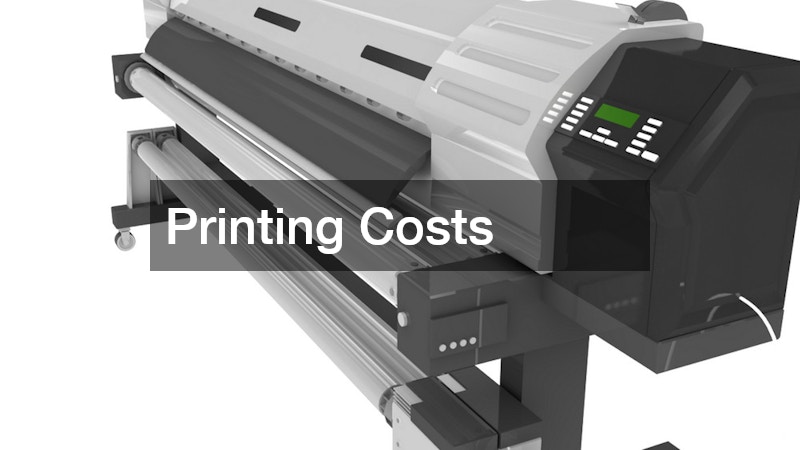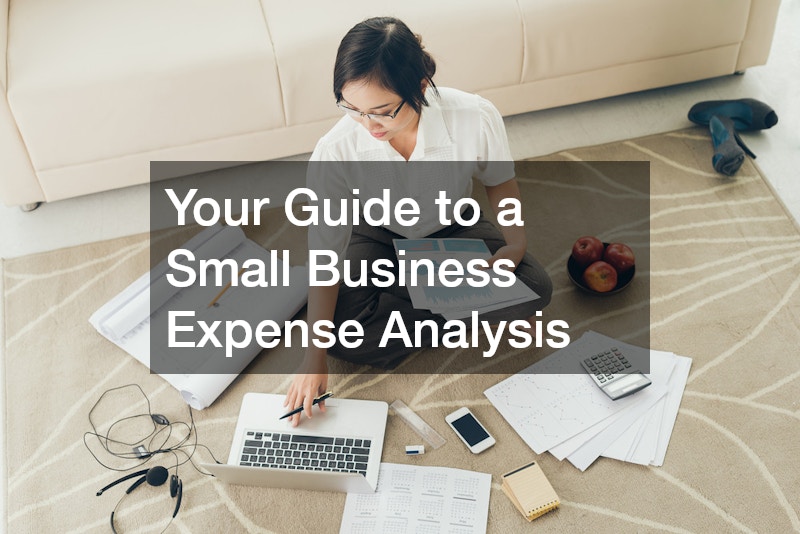Running a small business involves juggling many different responsibilities, and financial management is a critical one among them. Understanding and analyzing expenses can often mean the difference between profitability and financial strain. This article provides an in-depth expense analysis of various potential costs facing small business owners today. Our examination covers a broad range of expenses that a small business might incur, addressing everything from printing costs and purchasing necessary equipment to hiring essential services like movers, plumbers, and HVAC companies. By exploring each category, we aim to equip small business owners with a clearer picture of their operational costs, providing insights and advice for better financial planning. This comprehensive expense analysis examines not only the direct costs associated with each category but also potential savings opportunities. We delve into frequently incurred expenses related to equipment purchases, from dock equipment to aluminum trailers. Furthermore, the article evaluates the costs of various commercial services such as roofing, plumbing, HVAC servicing, and more. With a keen focus on financial prudence, each section breaks down the dynamics of these expenses and offers practical tips to optimize spending. By the end of this article, you will have a nuanced understanding of the financial commitments needed to successfully maintain and grow your small business.
Printing Costs

For many small businesses that exist in the United States, especially those in retail or food service, local screen printing can represent a significant ongoing expense. Integrating a local screen printing service can help streamline branding efforts by providing custom-designed merchandise or uniforms. As part of your expense analysis, it’s important to consider fluctuation in demand and bulk ordering discounts that could potentially lower costs over the long term.
Additionally, when analyzing expenses related to printing and everything that could be related, businesses should account for the quality and durability of the printed materials. A detailed expense analysis would factor in the lifecycle of printed products, weighing the cost against longevity to ensure a cost-effective investment. Many small businesses also stretch budgets by partnering with local screen printing businesses that offer promotions or loyalty programs.
To maximize budget efficiency, consider establishing a relationship with a local screen printing provider that understands your business needs. Through negotiation and an in-depth expense analysis, you might leverage price reductions or exclusive deals. Regularly revisiting and re-evaluating this vendor relationship is key to maintaining cost-effective operations over time.
New Equipment
Purchasing new equipment for your business can entail a substantial initial outlay for small businesses, but is often a necessary step to improve productivity and service offerings. Dock equipment, for example, is crucial for businesses involved in logistics or inventory management, helping streamline operations and improve efficiency. An expense analysis in this area would focus on both the initial purchase price and ongoing maintenance costs.
A thorough assessment of dock equipment costs should also include potential financing options. Many suppliers offer leasing arrangements or installment plans that can help manage cash flow more effectively. As part of the expense analysis, it is worth considering the potential return on investment (ROI) of new equipment through increased productivity or reduced staffing needs over time.
Businesses should regularly perform an in-depth expense analysis to evaluate whether upgrades or replacements are necessary. By aligning equipment purchases with strategic business goals, it’s possible to generate a favorable ROI. Furthermore, staying up-to-date with advancements in dock equipment technology could reveal products that enhance operational efficiency and reduce long-term costs.
Large Equipment
For many small enterprises, investing in large equipment is a considerable decision with long-term financial implications. Aluminum trailer sales, for example, are common for businesses that rely heavily on transportation for goods delivery or supply chain operations. Through rigorous expense analysis, business owners can determine whether purchasing or leasing large equipment offers the most financial and operational benefits.
In conducting an expense analysis for large equipment purchases, it’s essential to look beyond the initial sale price. Factors such as fuel efficiency, capacity, durability, and maintenance costs should be part of the equation. Opting for modern, energy-efficient models may lead to reduced operational costs and contribute positively to the return on investment. Look at warranties or insurance that come included or can be purchased alongside the large equipment.
When managing large equipment expenses, businesses should also consider market trends that might influence future resale value. Continuous market research and regular expense analysis ensure that decisions made today will not lead to unexpected financial burdens in the future. Partnering with reliable suppliers for aluminum trailer sales ensures access to quality products and robust after-sale support, adding another layer to your expense strategy.
Moving Services

Relocating a small business or transporting large equipment involves accessing professional moving services. Engaging a local mover can relieve significant logistical stress, allowing business owners to focus on other operational areas. You also have insurance should anything be damaged during the move, making sure your business is protected in every way. An expense analysis in this context should consider market rates, seasonal pricing fluctuations, and the breadth of services offered.
During the expense analysis, potential additional fees like insurance, special handling, or expedited services should be considered. Choosing movers who offer transparent pricing can save money and prevent unexpected expenses. Additionally, sourcing quotes from several local movers allows owners to gauge typical market prices and select the service that best suits their budget.
Building a long-term relationship with a trusted local mover might yield financial benefits. Regularly leveraging their services can sometimes qualify a business for repeat customer discounts or preferential rates. Such financial strategies, rooted in regular expense analysis, ensure efficient allocation of resources within tight budgets.
Plumbing Services
Plumbing services are another key consideration in the expense analysis for small businesses, particularly those in hospitality or retail where restroom facilities must be reliable and efficient. A commercial plumber can help prevent costly downtimes due to plumbing issues, making them a crucial component of ongoing maintenance budgets. The worst thing that can happen to a customer is a plumbing emergency. That’ll stain the business’s reputation.
When conducting an expense analysis of plumbing services, it’s vital to account for both routine service plans and potential emergency repairs. While scheduled maintenance by a commercial plumber might involve predictable costs, emergencies can lead to sudden and substantial financial outlays. Ideally, a balance of both should be incorporated into the budget. That way, you can budget for repairs rather than scramble to pay for emergencies.
Many small businesses reduce costs by entering into service agreements with a commercial plumber, offering regular maintenance at fixed prices. This proactive approach allows owners to budget accurately, prevents major disruptions, and ultimately lowers repair costs over time. Such agreements should be revisited regularly as part of an effective expense analysis strategy.
HVAC Service
Maintaining a comfortable and energy-efficient environment is essential for any small business, and often requires the expertise of a commercial HVAC company. These services should feature prominently in any comprehensive expense analysis. From installation to ongoing maintenance and emergency repairs, HVAC expenditures can significantly impact a business’s overall budget.
Expense analysis in this area should focus on the benefits of routine maintenance contracts with a commercial HVAC company. Preventative measures often save more costs compared to reactive fixes. These contracts can extend the life of HVAC systems, improving efficiency and ultimately realizing cost savings on energy bills.
Investments in energy-efficient HVAC upgrades might seem costly upfront but can offer long-term benefits. Such expenditures should be evaluated with a thorough expense analysis, weighing immediate costs against the potential for substantial savings on utility bills. Relationships with a reliable commercial HVAC company offer peace of mind and ensure business operations remain smooth and undisturbed.
Roofing Service

Roofing services are an inevitable expense for many businesses, whether for repairs, maintenance, or complete overhauls. The costs associated with hiring a professional roofing service should be considered carefully within an expense analysis framework, particularly in regions susceptible to extreme weather conditions. Not to mention, it’s an investment in the safety of your clients and the business itself.
Expense analysis for roofing involves assessing not just the repair costs but the potential savings from preventing structural damage. Costs can escalate quickly if roofing issues are not addressed promptly, leading to more expensive restorations. Service contracts with a reputable roofing service provider should be considered to help manage costs comprehensively.
Opting for high-quality materials and services may command higher upfront costs, but longevity and fewer service needs can generate savings over time. A financial strategy based on detailed expense analysis guarantees that those costs translate into long-term business benefits, safeguarding the property and its contents against the elements. That’s why it’s a great thing to consider beforehand.
Concrete Service
Many small businesses require concrete services for a variety of tasks, from building foundations to installing walkways and parking lots. A precise expense analysis should help in choosing quality materials and services that fit the business’s financial plan. Concreting expenses also vary significantly based on the project’s scale and complexity.
Expense analysis should factor in the costs associated with preparation, material, and labor. Skilled concrete services can impact both immediate cost efficiency and the long-term durability of the installations. With a thorough analysis, businesses can identify potential savings without compromising the quality and longevity of the project.
Contracting reliable concrete services typically involves analyzing cost proposals and comparing different service providers. Businesses should seek recommendations and evaluate past project experience as part of their due diligence process. As concrete installations are crucial for infrastructure, detailed expense analysis ensures money is adequately allocated to these critical services.
General Contractor
For businesses planning construction or renovation, hiring a general contractor can coordinate these activities effectively. A comprehensive expense analysis should include all aspects of commercial contracting, from initial planning to project completion. Investing in a proficient general contractor can lead to cost savings through better project management and resource allocation.
Cost evaluation for commercial contracting should include consultation fees, site inspections, materials, and labor. General contractors often have established relationships with subcontractors and suppliers, which can translate into negotiated rates and reduced expenses. Thus, engaging their services might ultimately contribute to a more balanced and effective expense analysis.
Ensuring that a commercial contracting project stays on budget requires careful monitoring and regular financial assessments. A well-documented expense analysis includes contingency plans for unexpected costs, thereby ensuring the business remains financially stable throughout the project duration. Partnering with experienced and transparent general contractors provides strategic benefits and peace of mind.
Catering

In many business events, hiring a catering company is essential to creating a positive and memorable experience. Expense analysis in this area implies a detailed examination of menu options, quantity estimates, and service fees. This ensures that the catering service aligns well with the budget while also meeting quality and presentation standards.
Expense analysis should evaluate the potential cost savings linked to ordering in bulk or selecting buffet styles over plated services. A catering company often provides menu packages that offer discounts when minimum order quantities are met. Understanding these nuances ensures that a business can achieve both quality and economy in their event planning.
A collaborative approach, working closely with a catering company to customize offerings within the business budget, can lead to significant financial benefits. By routinely reviewing vendor agreements as part of the expense analysis, businesses can find more cost-effective options and improve event planning efficiency without sacrificing quality.
To conclude, a strategic and thorough expense analysis serves as a foundation for efficient financial management in any small business. This analysis considers nuanced costs associated with equipment purchases like dock equipment or large items such as aluminum trailers, as well as essential services such as those offered by a commercial plumber or roofing service. With structured examination and strategic partnerships with local service providers—including local screen printing, commercial HVAC companies, and concrete services—a business can optimize its operational budget. Regular budget reassessments help identify savings opportunities and ensure that investments yield worthwhile returns. Commitment to detailed expense analysis fosters not just survival but growth and profitability within the competitive small business sector.

